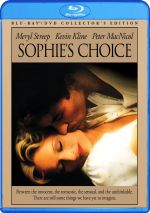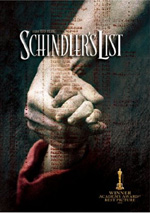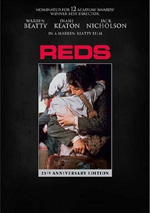|
SHOUT! FACTORY
|

| |
|
MOVIE INFO
|
|
Director:
Alan J. Pakula
Cast:
Meryl Streep, Kevin Kline, Peter MacNicol, Rita Karin, Stephen D. Newman, Greta Turken, Josh Mostel, Marcell Rosenblatt
Writing Credits:
Alan J. Pakula, William Styron (novel)
Tagline:
Between the innocent, the romantic, the sensual, and the unthinkable. There are still some things we have yet to imagine.
Synopsis:
Screen-favorite Meryl Streep received an Academy Award for her portrayal of Sophie Zawistowska in this penetrating drama set in 1947 post-World War II Brooklyn. Kevin Kline plays her all-consuming lover, Nathan. The story revolved around Sophie's struggle as a Polish-Catholic immigrant in the United States who had survived a Nazi concentration camp. The lovers' drama unfolds through the observations of a friend and would-be writer, Stingo (Peter MacNicol). As the trio grows closer, Stingo discovers the hidden truths that they each harbor, resulting in a narrative that is both captivating and moving.
Box Office:
Budget
$12 million.
Opening Weekend
$202,131 on 9 Screens
Domestic Gross
$19,962,353
MPAA:
Rated R
| |
|
DISC DETAILS
|
Presentation:
Aspect Ratio: 1.85:1
Audio:
English DTS-HD MA Monaural 2.0
Subtitles:
English
Closed-captioned
Supplements Subtitles:
None
Runtime: 150 min.
Price: $29.93
Release Date: 4/29/2014
Bonus:
• Audio Commentary with Director Alan J. Pakula
• Roundtable Discussion
• Trailer
• DVD Copy
| |
|
PURCHASE @ AMAZON.COM
|

| |
|
EQUIPMENT
|
Panasonic TC-P60VT60 60-Inch 1080p 600Hz 3D Smart Plasma HDTV; Sony STR-DG1200 7.1 Channel Receiver; Panasonic DMP-BD60K Blu-Ray Player using HDMI outputs; Michael Green Revolution Cinema 6i Speakers (all five); Kenwood 1050SW 150-watt Subwoofer.
| |
|
RELATED REVIEWS
|


| |
|
Sophie's Choice [Blu-Ray] (1982)
|
|
Reviewed by Colin Jacobson (April 10, 2014)
At this point in film history, 1993ís Schindlerís List seems to be regarded as the ďdefinitive movieĒ about the Holocaust, and it clearly has been accepted by the public as the best picture on that subject. Let the world have it. While Spielberg's movie has some moments, I think the most stunning film about the Holocaust appeared 11 years prior to it when Sophie's Choice hit the screens in 1982.
The films take rather different approaches to the tragedy. Both attempt to personalize the Holocaust to some degree, but List offers a broader portrayal of the horror and it also displays much more graphic imagery. Choice, on the other hand, keeps gruesome sights virtually unseen, and it makes no attempt to create any sort of global story of the Holocaust. This is one woman's story, and what a devastating story it is.
I don't want to spoil too much of the film for anyone who hasn't seen it, but Choice starts off in a deceptively sweet and innocent manner that doesn't set up the viewer for the drama yet to come. Actually, scratch that - precursors of future events are on screen, but the generally calm and happy demeanor of the first half of the movie negates most hints. It leads the viewer to believe the movie will be a wistful and charming remembrance of happy days gone past from our narrator, an aspiring writer named Stingo (Peter MacNicol) and his friendship with charming couple Nathan (Kevin Kline) and Sophie (Meryl Streep).
That all comes crashing down as the issues of Sophie's past come back to haunt her and we discover what had happened to her during her earlier life in Poland. Again, I don't want to get into many details, except that the personal way in which the film explores Sophie's experiences in Nazi Germany really makes the emotions broader and more powerful; this isn't just some nameless, faceless body. And although I know it's coming, the "choice" that gives the film its title always slams me like a brick against my head. I'm not exaggerating when I state that I feel that moment of the film is arguably the most powerful and shattering thing I've ever seen in a movie.
Streep won a justly-deserved Oscar for her portrayal of Sophie. At this point we somewhat take for granted Streep's talents, especially with her "accent of the week", but that shouldn't take away from the deft way in which she handles all of the multitude of emotions she must display in this film, all of which seem absolutely effortless and real.
Also wonderful is Kline as Sophie's manic boyfriend Nathan. Some critics knocked Kline for over-emoting in the role, but they missed the point. Due to psychological issues, Nathan should be all over the place and be larger than life, and Kline nails the character. He easily transitions from sublime charm to terrifying menace throughout the film.
MacNicol gets the more thankless role of Stingo, our narrator's younger self. He's the audience's entrance into the film, so he has to maintain a pretty even temperament and doesn't get to act in a showy way like the other two. He makes Stingo a fairly likable character and fulfills the expository nature of his part nicely.
As I prepared this review, I happened to check out the reader comments left on IMDB. Most of them praise the movie, but one offers a differing viewpoint. That person mentions the fact that this Holocaust movie hardly focuses on Jewish suffering and clearly disparages the film for not taking that approach. He/she even suspects a sinister motive behind author William Styron's work that seems to imply some sort of Holocaust denial on his part.
To be frank, I find this viewpoint absurd. While it's undeniable that Jews bore the brunt of the Nazi savagery, does that mean that every film about the Holocaust has to directly concern them or it's somehow untrue or flawed? Does it also mean that every film about the Holocaust has to graphically display images of all the horrors or somehow the movie becomes a "cover-up"?
I think not. Sophie's Choice more effectively conveys the horror of what the Nazis did than 1000 shots of emaciated bodies being dumped into pits ever could. One can easily become numb to all of the images of death and decay that we associate with the Holocaust. We've seen those shots so many times that they've become almost unreal, and they're so grotesque that it's easy to subconsciously block them out and not really take in what they represent.
That never happens during Sophie's Choice. We are forced to put ourselves in the shoes of our protagonist and witness the terror firsthand. When I see the horrific images of emaciated and disfigured bodies, I just want to turn away - it's too terrible to watch and it all seems too unbelievable to take. The same does not happen in Choice. Its atrocities are all too real and are impossible to ignore or to avoid.
Would Sophie's story have been more powerful or compelling if the character had been Jewish? Not one iota, and the lack of graphic imagery actually makes the tale more terrifying and upsetting. One can become numb to the persistent sight of tortured bodies, but Choice forces us to confront the core of how the pettiness and inhumanity of what happened could affect all of us. As such, it makes for a most powerful film experience.
|
The Blu-ray Grades: Picture C+/ Audio C+/ Bonus B-
|
|
Sophieís Choice appears in an aspect ratio of approximately 1.85:1 on this Blu-ray Disc. The source material made this an erratic presentation, but it was usually satisfactory.
Sharpness became one of the up and down areas. Parts of the movie displayed strong clarity, while others tended to be soft and mushy. Some of this related to the original photography, but it became tough to credit all the ill-defined shots to the source. No issues with jaggies or shimmering occurred, and I saw no edge haloes. With ample grain, I didnít suspect digital noise reduction, but occasional print flaws showed up along the way. This meant sporadic specks but nothing severe.
Colors tended to be subdued. The Brooklyn sequences leaned toward an amber tint, while flashbacks went more with a desaturated sepia feel. The hues lacked much pep but they were adequate given the restrictions of the source. Blacks came across as acceptable, and low-light shots came with reasonable clarity. Nothing here excelled, but the image seemed like a decent replication of the original photography.
As for the DTS-HD MA Monaural 2.0 audio of Choice, it also appeared find for a movie of this oneís age and ambition. Speech remained natural and concise, with only a smidgen of roughness at times. Music was fairly warm and full, and effects appeared pretty accurate. The latter elements didnít demand much, but they came across with appropriate clarity. This was an adequate mix.
How did this Blu-ray compare to the DVD from 1998? Audio seemed warmer and fuller, with better clarity. Visuals were tighter, more concise and film-like. Even with the issues I noted earlier, this became an obvious step up over the low-quality DVD. I noticed all sorts of elements that were too blurry and mushy to discern on the prior disc, so this was a superior presentation.
When we shift to extras, we find the same running, screen-specific audio commentary from director Alan J. Pakula found on the DVD. The director discusses storytelling and point of view, cast, performances and relationships, the use of narration, financing problems, and a few other production topics.
At his best, Pakula provides a thoughtful, intelligent view of his film. He deals with the creative issues well and offers a nicely insightful take on things. Unfortunately, he goes silent an awful lot of the time, and the commentary lacks breadth. Pakula sticks with the story side of things so intensely that we donít get a good feel for other subjects and the production as a whole. This remains a valuable commentary but itís an erratic one.
In addition to the movieís overly romantic trailer, we get a new extra: a roundtable discussion. Hosted by Pakulaís former agent Boaty Boatwright, the 45-minute, 39-second panel features actors Meryl Streep and Kevin Kline, novelistís widow Rose Styron, Pakulaís widow Hannah, and Pakulaís executive assistant/producer Donald Laventhall. We learn about what drew them to the film, casting and performances, sets and locations, reflections on the original novel. Pakulaís methods on the set, and some other notes.
Expect the actors to dominate this discussion. While we get a fair amount of material from the others, Kline and Streep deliver the preponderance of the comments, and I feel fine with that, especially since they contribute a lot of fine notes. Though not as good as the documentary from the prior DVD, this becomes a solid little chat.
A second disc provides a DVD copy of Sophieís Choice. This includes the same extras as the Blu-ray.
Does the Blu-ray lose anything from the original DVD? Yup. It drops some useful text notes/biographies as well as the excellent documentary I mentioned. Itís a shame these didnít reappear here.
Sophie's Choice is one of the best movies ever made. Even though I've seen it a few times, it retains its power to stun and provoke; I may know what's coming, but that doesn't alter the movie's devastating impact. The Blu-ray brings us acceptable picture and audio with some informative bonus features. Fans will want to keep the old DVD for its documentary, but this becomes the strongest representation of the film itself.
To rate this film, visit the original review of SOPHIE'S CHOICE
|
|

